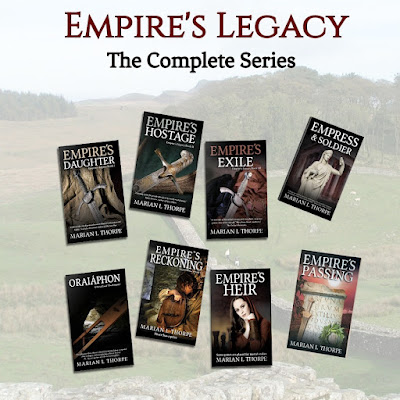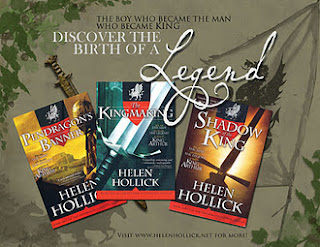 |
| Welcome to my Blog! Wander through wonderful worlds real and fictional, meet interesting people, visit exciting places and find a few good books to enjoy along the way! |
With the publication of Empire’s Passing (Feb 2024) Marian’s Empire’s Legacy series of eight books is complete. In a unique blend of historical and speculative fiction, the series follows four main characters: the fisherwoman Lena, the scholar Cillian, the musician Sorley, and the soldier Druisius, as they meet the challenges of their time, as warriors, diplomats, spies and leaders.
Bound by vows of loyalty and love, they have little chance to succeed. But winning a war is only the beginning of saving a land, and what might lie after victory will demand secrecy and sacrifice too – not only of the four, but of the next generation as well.
Empire’s Legacy is a saga of choices, betrayals, intrigue, and love, where some battles of power and politics are won with swords – and some with words.
Transmutation by Marian L Thorpe
We’d just rounded a hairpin bend somewhere in Spain’s Sierra Nevadas when half a dozen creamy-brown animals crossed the road in front of us. Luckily, what I said was drowned out by shouts from other participants in the nature tour we were on. They said, loudly, ‘Ibex!’ I said, quietly (thank goodness), “gemzē!”
“Gemzē” is my fictional name for the ibex-like animals my characters encounter in my third book, Empire’s Exile. But this blurring of my fictional world, based heavily on Europe’s geography and ecology (as well as to a lesser extent on its history and political boundaries) with the real world is an amusing, but real, side effect of having spent much on my mental life for the past twenty-five years and more in a parallel universe.
A geography question on University Challenge? I have to translate Qipërta and Odïrya into Albania and Bulgaria, and quickly enough to get the answer out before the brilliant young minds on the show. (It never happens – the aging synapses don’t move fast enough to retrieve the information, let alone make the switch from my fictional countries to the real ones.) A question on Roman Emperors? Same problem. Even if I know the answer is Trajan, I’m likely to say Ulpius. And it’s Marcus Aurelius’s Meditations, not Catilius’s Contemplations.
Some years ago I wrote, in an urban fantasy short story: ‘it's just a different reality, overlaying the everyday…these streets, these fields...for much of my life I've held two realities in my mind: the world we all walk in, and the world I walk in my dreams.’ I had no idea, at the time, that I was describing exactly how I would come to see at least part of the world, the part I have tweaked into the lands of my books.
I set out to create a world that felt historical, felt real, felt familiar, so that the changes in societal structures and values that my books are built around are just about the only thing that’s challenging the reader. I didn’t want to ask the reader to consider questions about the role of women, about the price of victory, about the meaning of family and the power and limitations of love, at the same time as having to accept sentient mice or learn a whole new geography.
There are some inconsistencies in this perception, places where the real has a firm grip. England is England, not my fictional Ésparias. But once (in real life) I’m just a bit north of the Scottish border, the imaginary has a tendency to take over – and north of the Highland Line, it’s my land of Linrathe I’m seeing. Up on the northern edge of Scotland, I’m in Sorham, with the curlews crying and the seals barking, and the broch on my character Sorley’s home soil standing against the sea.
When I began the series (without knowing it was going to be a series) I simply based the opening scenes on places I knew: a bit of Anglesey, a bit of Dorset. That there was a wall in the north of this country, dividing it from a historic enemy also just slipped into place. I am both a countrywoman and a fairly competent field naturalist (and a bit of a landscape historian) so the details of the landscape came naturally. So did most of the history – or the ‘what if’ version of history: what if, in a country that looks a lot like England, a version of the Roman Empire had continued? What if the country north of the wall is a source of maintained learning and history, not through Celtic Christianity and its abbeys, but through secular schools? What if disease and depopulation (and an impassible mountain range) had cut off this western edge of the world from the civilizations of the east? I can stand on the eastern edge of England, looking out over the North Sea and drowned Doggerland, and see in my mind the mountains I put in its place, as if the landmass of the British Isles had rammed itself against Europe with extreme force, pushing up peaks both high and wide—a barrier more formidable than any sea.
It's easy to accept this: it really is only a problem when trying to answer trivia questions or recall the name of a Roman emperor (or the proper name for an ibex!). But as I begin, very tentatively, to dip a toe into the waters of the next book(s), I’m more conscious of the process of overlaying the real world with my parallel one. I can’t say too much (in part because I don’t know very much) but they will involve a trading guild similar to the Hanseatic League, and take place in an analogue of 12th to 13th century Europe. The market town of King’s Lynn, the closest town of any size to where I spend my winters, had Hanse connections, and, coincidentally, was once essentially two towns with parallel markets and minsters and harbours, similar to my fictional Casille (if for different reasons). I know Lynn reasonably well – but already, the town I see now as I walk its medieval streets isn’t quite the town I saw two years ago. It’s carrying another town over top (or underneath?), one that doesn’t exist anywhere except in my mind, and a few lines in an exploratory short story.
But one thing didn’t change between the real world and my imaginary one: every bird I mention carries either its (real) common or dialect name – assuming the first-person narrator knows it! But even when he or she doesn’t, the description is recognizable to a birder. Some things, it appears, my mind finds immutable!
About the Author
After two careers as a research scientist and an educator, Marian decided it was time to do what she’d always really wanted, and be a writer. As well as her novels, she’s published short stories and poetry. Her life-long interest in Roman and post-Roman European history provided the inspiration for the books, while her other interests in landscape archaeology and birding provide background.
buy the books
Website:
Instagram:
1. What was the first novel you read that made you think: ‘Wow, I want to write like this!’
Mary Stewart’s The Crystal Cave. She made me be in the landscape of post-Roman Britain, and her characters were so human, and so believable.
2. What book (fiction or nonfiction) is a treasure that you’d pass on to a grandchild
(if you had one)
Guy Gavriel Kay’s Tigana, a book that carries more sorrow and more hope than anything else I’ve read.
3. If you found a genie in a magic lamp what would your three wishes be?
For a world free of war, want, and disease. (Which will need a genie in a lamp to happen, I’m afraid.)
4. If you could have a holiday anywhere in the world (for free!) where would you go?
Tough one, since I’ve been just about everywhere I want to go, but making my next planned trip to the Baltic and Scandinavia free would be nice.
5. Your favourite time period – and why
Early medieval, because the world was far more connected and complex and sophisticated than I was taught in childhood, and learning about trade routes and the exchange of learning and ideas and scholarship (along with silk and jewels and lots of other things) fascinates me.
6. Name one thing you regret that you didn’t do
I have almost no regrets, but there are a few musicians I failed to see in concert prior to their deaths. Pete Seeger and Stan Rogers are the ones I most wish I’d heard live.
7. Name one thing you’re pleased that you did do
Travelled to the Altai Mountains of Mongolia on the chance of seeing a snow leopard in the wild – and I did.
Next Guest Post >
this month's themed tour guests:
Samantha Wilcoxson
Anna Belfrage
the authors of 1066 Turned Upside Down
Inge H. Borg
Charlene Newcomb
Alison Morton
Marian L Thorpe
*** ***
You might also like
books written by Helen Hollick
Website: https://helenhollick.net/
Amazon Author Page: https://viewauthor.at/HelenHollick
*
The SEA WITCH VOYAGES
nautical adventures set during the Golden Age of Piracy
*
THE SAXON SERIES
 |
| The story of the events that led to The Battle of Hastings in 1066 Harold the King (UK edition) I Am The Chosen King (US edition) 1066 Turned Upside Down an anthology of 'What If'' tales |
*
KING ARTHUR
The Pendragon's Banner Trilogy
The Boy Who became a Man:
Who became a King:
Who became a Legend...
 |
| Book 1 -THE KINGMAKING Coffee Pot Book Club Bronze Award 2023 |
*
Includes a story by Marian L. Thorpe
*
NON-FICTION
*
 | |
|
*









.jpg)









Thanks for the opportunity to be part of this, Helen!
ReplyDeletemy pleasure Marian
Delete